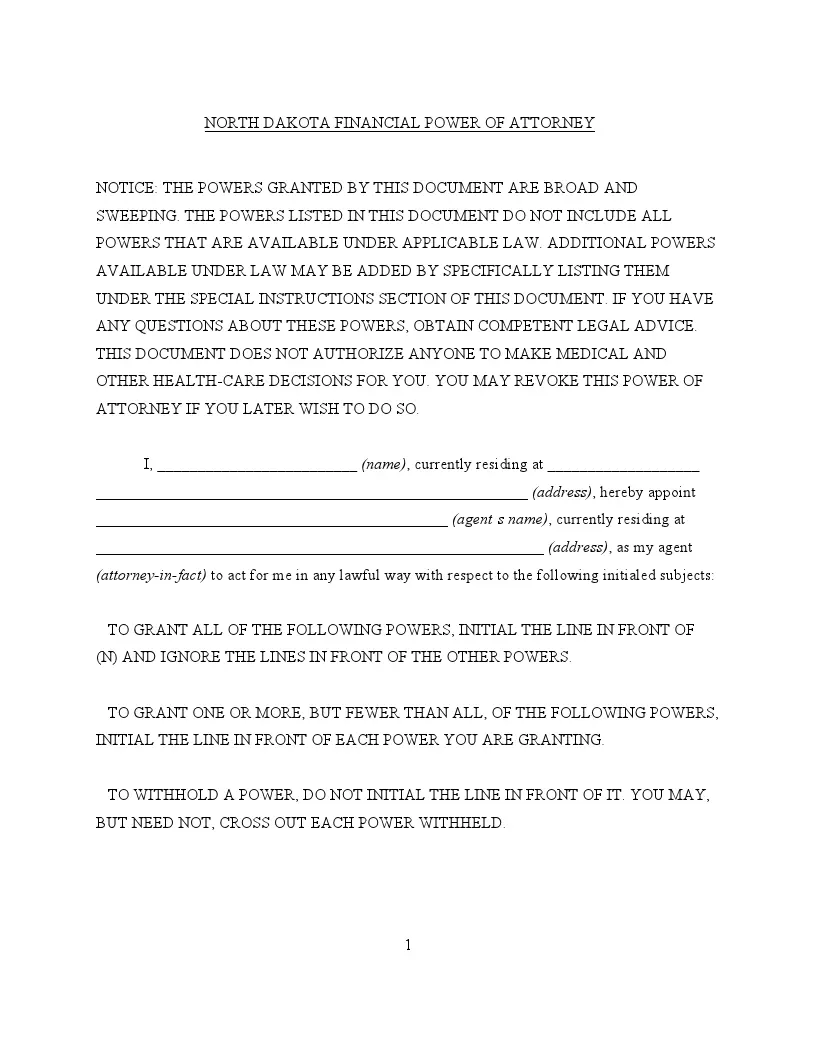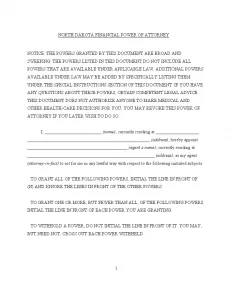North Dakota General Financial Power of Attorney Form
The North Dakota general financial power of attorney is a legal document that enables you to appoint someone, known as an “agent,” to manage your financial affairs. This can include handling bank transactions, managing real estate, and making investment decisions on your behalf. This arrangement will be beneficial if you cannot manage your finances due to illness or absence.
Unless specified differently, this power of attorney form will automatically end if the principal becomes incapacitated. This option contrasts with a durable power of attorney, which remains valid and in effect even if the principal loses capacity. If you need a separate document for such cases, get all North Dakota POA forms on FormsPal.

Build Your Document
Answer a few simple questions to make your document in minutes
Save and Print
Save progress and finish on any device, download and print anytime
Sign and Use
Your valid, lawyer-approved document is ready
The rules regarding power of attorney in this jurisdiction are detailed in the North Dakota Century Code Title 30, specifically Chapter 30.1-30. It is notable that these sections do not explicitly refer to the general power of attorney form itself, which underscores the need for careful legal interpretation and compliance when drafting such documents.
The elements usually found in a general financial power of attorney in North Dakota are as follows:
- Principal and agent information.
- Powers you are granting to your agent.
- Effective date and term of the authority.
- Specific exclusions or limitations.
While the North Dakota Century Code does not mention the requirement for notarizing a general power of attorney, it is strongly advised that a public notary should be present during the signing. This action ensures the document is executed properly and strengthens its enforceability in legal situations.
North Dakota General Power of Attorney Form Details
| Document Name | North Dakota General Power of Attorney Form |
| Other Name | North Dakota Financial Power of Attorney |
| Relevant Laws | North Dakota Century Code, Chapter Chapter 30.1-30 |
| Avg. Time to Fill Out | 10 minutes |
| # of Fillable Fields | 41 |
| Available Formats | Adobe PDF |
Filling Out North Dakota General (Financial) POA Form
When preparing a North Dakota general financial power of attorney, fill out the form carefully to ensure that your financial affairs are managed according to your wishes.
1. Identify the Principal and Agent
Start by filling in your full name and complete residential address under the section marked for the principal. Similarly, enter the full name and address of the person you appoint as your agent.
2. Granting Powers
Initial next to each specific power you want to grant to your agent. These powers range from real estate transactions (A) to tax matters (M). If you want to grant all listed powers, initial only next to item (N).
3. Special Instructions
Use this section to specify any details or limitations not covered by the standard powers. This could include additional powers or specific instructions regarding the powers granted.
4. Effective Date
Choose when the general power of attorney will become effective. You can make it effective immediately or specify a start date. Initial next to your choice.
5. Termination Date
Decide how the general power of attorney will end. You can choose termination upon a written revocation, a specific date, or upon your incapacitation. Initial next to the appropriate choice.
6. Successor Attorney-in-Fact
If you wish to designate a successor agent who will take over if your primary agent is unable to fulfill their duty, you should write their name and address in the specified area.
7. Sign and Notarize
After reviewing all sections and ensuring all information is correct and complete, sign and date the form in the presence of a notary. The notary will also need to sign and seal the document to notarize it, verifying your identity and the signature’s authenticity.
